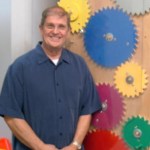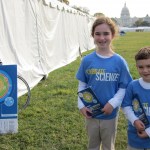Science
By Larry Bock
Founder and organizer, USA Science & Engineering Festival
Encouraging and motivating kids early in science and engineering via exciting, hands-on interactions in discovery may be one of the most important steps to boosting their interest and performance in these fields.
But if you think this job falls to teachers alone, you're wrong. Parents can, and should, play an active and frequent role outside the classroom, especially in creative ways that keep children's innate sense of curiosity and exploration alive.
"Kids love the chance to try experiments, visit zoos, or watch…
Each week we like to acknowledge those that truly make our Festival the largest celebration of science: our fans. Without the support of our fans, we would not be able to able to achieve our mission which is to re-invigorate the interest of our nation's youth in science, technology, engineering and math (STEM) by producing and presenting the most compelling, exciting, educational and entertaining science festival in the United States. Our fans travel from near and far to attend the Festival and along with our volunteers; they help us maintain the buzz of this celebration all year long.
This…
By: Gabrielle Levy, age 9, USA Science & Engineering Festival Volunteer and Ambassador, from Fairfax, Virginia.
It's time to learn about science! Let's visit the USA Science & Engineering Festival that returns to Washington DC on April 28 and 29. This year the USA Science & Engineering Festival will be held in the Washington Convention Center.
There will be everything from NASA, Universities, businesses, and famous television scientists. There will be many fun activities to learn about science in a fun way. Even if you think that you really do not like science, you will…
I've always been reluctant to attribute antiscientific attitudes to one political persuasion or another--and justly so, or so I thought. While it's true that antiscience on the right is definitely more prominent these days, with the Republican candidates conducting virtual seminars on how to deny established science. Evolution? They don't believe in it because, apparently, Jesus told them not to. Anthropogenic global warming? they don't buy that, either, because to admit that human activity is resulting in significant climate change would be to be forced to concede that industry isn't an…
The Subject: header pretty much says it all: How to Teach Relativity to Your Dog is reviewed in Nature Physics. I am inordinately pleased with the existence of this-- not because I expect it to sell a significant number of books, but because a serious technical publication recognized it as worth writing up, despite the silly title.
Of course, Nature being Nature, it's paywalled, so you can only read the full thing via the above link if you have institutional access, or know a nice person who will email you a copy when you ask for it on Twitter. The review itself is about what I would expect…
One of the big stories in genre Internet news was Seanan McGuire's post last week, about reactions to the early release of some copies of her book, and the hateful garbage thrown her way by people outraged that the ebook didn't slip out early as well. And let me state right up front that the people who wrote her those things are lower than the slime that pond scum scrapes off its shoes. That's absolutely unconscionable behavior, and has no place in civilized society.
That said, Andrew Wheeler picked up on something that also struck me as odd, namely the way McGuire was so upset about paper…
The George Washington University School of Engineering and Applied Science has been an amazing and supportive sponsor to the USA Science and Engineering Festival. In addition to sponsoring the Festival, SEAS has been instrumental in spreading the word with a dedicated section of their website focused on the Festival including how to become involved, an alumni challenge and information on their sponsorship events.
As a proud sponsor of the USA Science and Engineering Festival, SEAS will host a number of pre-Festival events the week of April 23rd in addition to the Finale Expo at the Walter…
I'm home with The Pip today, so no extended typing for me, but I pre[ared for this by typing something up ahead of time, and getting John Scalzi to post it for me, as part of his Big Idea series:
In a way, a book about Einstein's theory of relativity is uniquely suited to a series about Big Ideas. Relativity, at its heart, is a theory built on a single Big Idea:
The laws of physics do not depend on how you're moving.
For all its fearsome reputation, everything stems from that single,simple idea. Whether you're moving or standing still, floating in space or on the surface of a planet, you…
The Pip says, "Hi, folks. My daddy's book is released today, and he's shameless enough to use me to promote it:"
"I can't read it yet, because I'm just a baby, but I can report that it was very satisfying to drool on. So you should definitely buy a copy, maybe two."
"Also, dig the awesome stuffed alligator toy I got from my Aunt Erin and Aunt 'Stasia. It crackles, and it has a mirror! It's so cool!"
If you're allergic to hype, you might want to tune this blog out for the next couple of days, because How to Teach Relativity to Your Dog is officially released tomorrow, so it's all I'm going to talk about for a little while. Because, well, I'm pretty excited.
And tonight's exciting finding is that it's mentioned in the Washington Post:
If "Physics for Dummies" left you baffled, maybe it's time to go a step further: Why not physics for pets? In "How to Teach Relativity to Your Dog," physics professor Chad Orzel attempts to explain Einstein's theory of relativity via a dialogue with his dog,…
We're in the home stretch of this term, and it has become clear that I won't actually be using the toy model of the arrow of time I've talked about in the past in my timekeeping class this term. These things happen. Having spent a not-insignificant amount of time playing with the thing, though, I might as well get a final blog post about it, with something that sort-of worked and something that shows why I'm not a computational physicist:
First, the thing that sort-of worked: in thinking about trying to use the code I wrote, I was struggling to come up with a way to quantify the apparent…
By Stacy Jannis
Exciting things are happening in 21st century classrooms all over our country. Teachers and students are using cutting-edge technology, working in teams, and connecting and sharing projects with classrooms all over the world. Innovative groups like the Concord Consortium , Promethean World , Project Lead the Way and Epals are at the forefront of creating the curriculum, software, tools and environment of tomorrow's classroom, today. A rich and exciting mix is brewing, one that combines multimedia, digital simulations, games, computer programming, inquiry and project-based…
Hey, you might not know this, but I wrote a book...
The official release date for How to Teach Relativity to Your Dog isn't until Tuesday, but a friend reported buying a copy in Missouri, so when I was headed out to do some work this afternoon, I went to the cafe at the local Barnes&Noble so I could check for myself, and there it was:
That's How to Teach Relativity to Your Dog spotted in the wild. I'm not going to say "in its natural habitat," because it's really a domestic animal, which belongs in a loving home, with people to care for it. Copies in the bookstore are feral editions,…
The other controversial thing this week that I shouldn't get involved in is the debate over whether Brian Cox is talking nonsense in a recent discussion of the Pauli Exclusion Principle. Tom at Swans on Tea kicked this off with an inflammatory title, and Cox turned up in the comments to take umbrage at that. Sean Carroll provides a calmer and very thorough discussion, the comments to which include a number of well-known science popularizers duking it out.
My take on it is basically the same as Tom and Jim Kakalios in Sean's comments: unless the two particles you're talking about are within…
It's not a good week for me to be writing about anything remotely controversial, but if I want to keep my physics blogging license, I need to say something about the latest fast neutrino news. This has followed the usual trajectory of such stories, with the bonus farcical element of people who blasted the media for buying into the initial release seizing triumphantly on an initial rumor in the press that was garbled into incomprehensibility. With a little more time, it's become more clear how their result has become less clear, and the best place to look for a description of this is Matt…
Back in September, I merrily applied a little not-so-Respectful Insolence to the service of deconstructing the overwhelmingly silly fear mongering by a group known as SANE Vax over the alleged discovery of HPV DNA in the HPV vaccine. SANE Vax, as you may recall, is a group founded by a woman named Norma Erickson dedicated to spreading misinformation about the HPV vaccine. If you peruse the SANE Vax website, you'll see that the common antivaccine tropes are all there; they're just directed mainly at the HPV vaccine. The hysterial fear mongering over the alleged discovery of DNA fragments of…
Both Phil Plait and Sean Carroll are tentatively reporting that they may have an explanation for the recent anomalous report of neutrinos traveling faster than light: it may have been a case of a faulty connection in a timing circuit. If that bears out, it may be a bit embarrassing.
But it does suggest an important possibility. When we get around to building the first starship, don't have those fussy, punctilious physicists wire it up. Gather a gang of sloppy slapdash biologists to stick it together with spit and chewing gum. We'll have it going a heck of a lot faster than light than those…
I was going to talk about a cool recent paper that described the evolution of novelties by way of modifying modular gene networks, but I started scribbling it up and realized that I was constantly backtracking to explain some fundamental concepts, so I stopped. I was concerned because one of the most common sources of confusion I've found in my students in the past was difficulty in distinguishing phenotypes from the complexities of the underlying genotype, and I have to be slow and thorough in setting up those differences early on until it sinks in, a habit I'm continuing here. It's so easy…
I'm grading exam papers at the dining room table when Emmy trots in. "Hey, dude," she says. "Where do we keep the superconducting wire?"
I'm not really paying attention, so I start to answer before I understand the question. "Hmm? Wire is in the basement, next to the--wait, what?"
"The superconducting wire. Where do we keep it?"
"We don't have any superconducting wire. And you're a dog. What do you need superconducting wire for, anyway?"
"I'm building a particle collider! I need superconducting wire for the beam-steering magnets."
How to Teach Relativity to Your Dog goes on sale next Tuesday…
A correspondent from the UK sends along this picture from the Waterstones outlet in Heathrow airport:
As you can see, How to Teach Quantum Physics to Your Dog is #55 on their bestseller rack, just ahead of Confessions of a London Call Girl. I'm not sure what this says about London call girls, but I'm pretty psyched that it's still selling well over there.
On this side of the Atlantic, I got a note from my editor at Scribner the other day that they've just printed another batch of the US paperback of How to Teach Physics to Your Dog, which is also good news. There's probably a blog post in…


